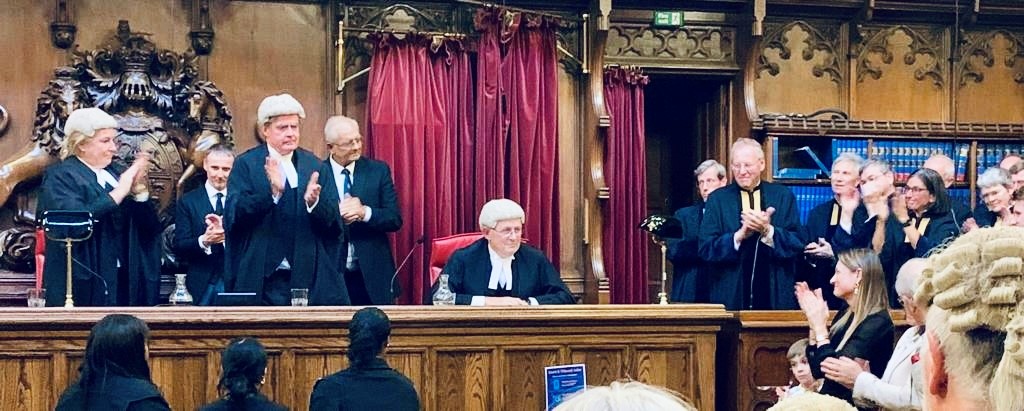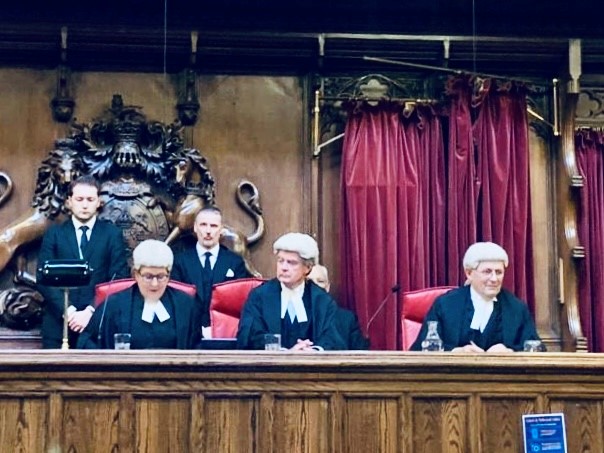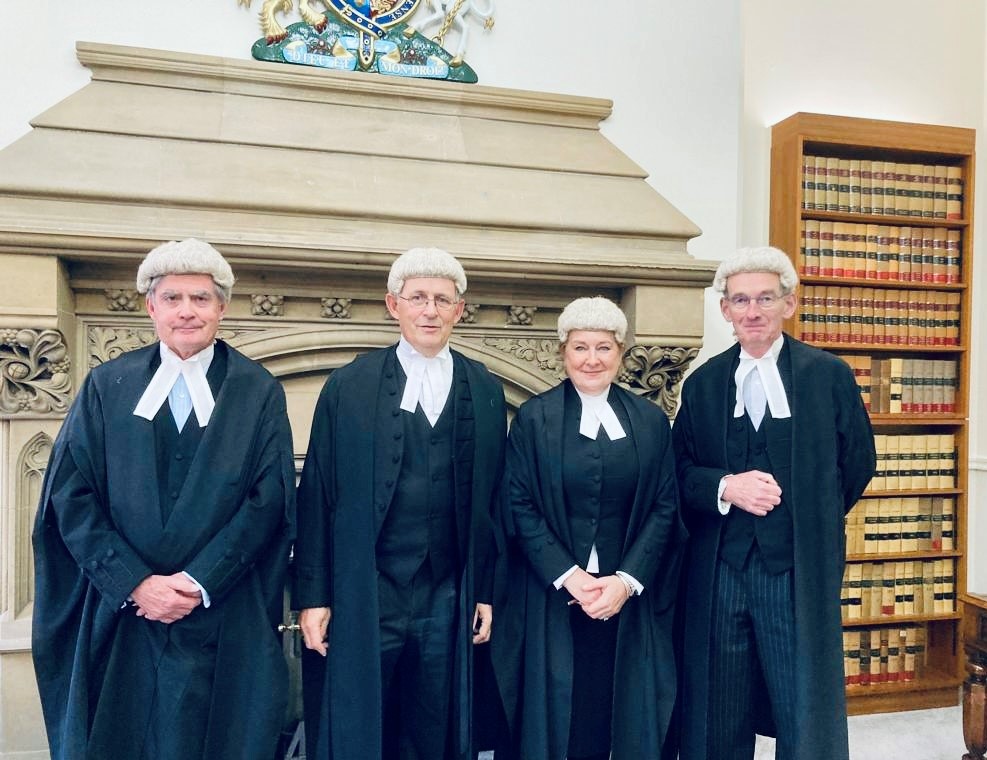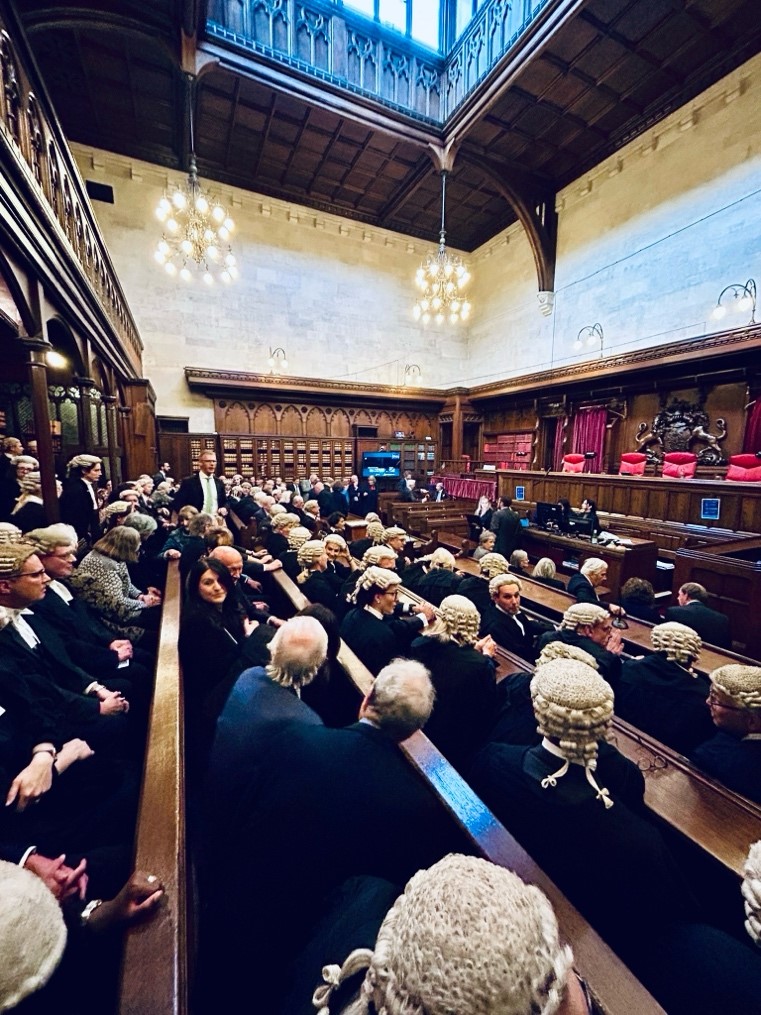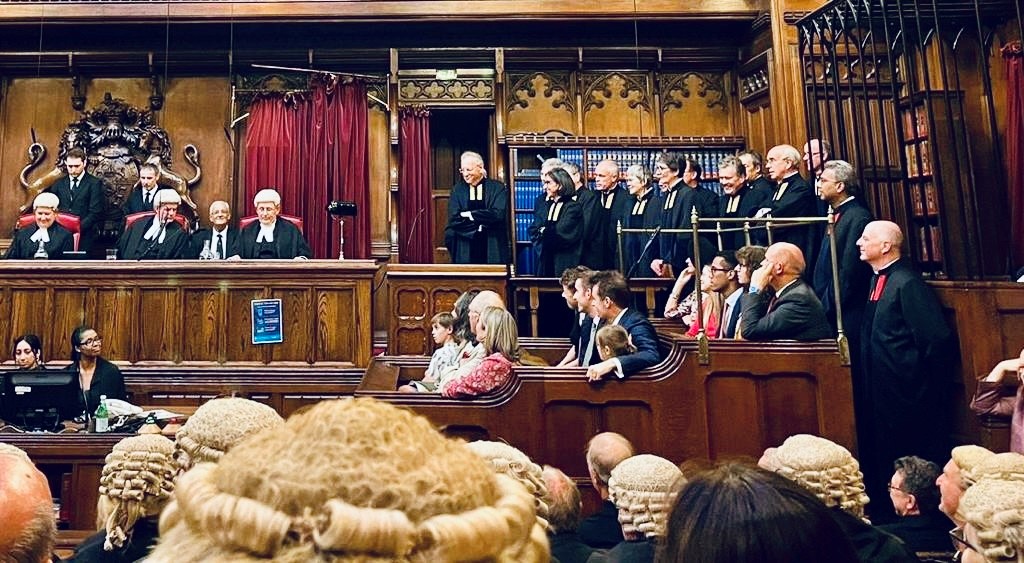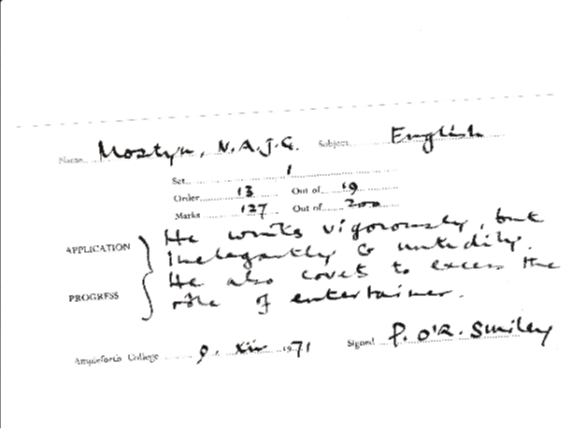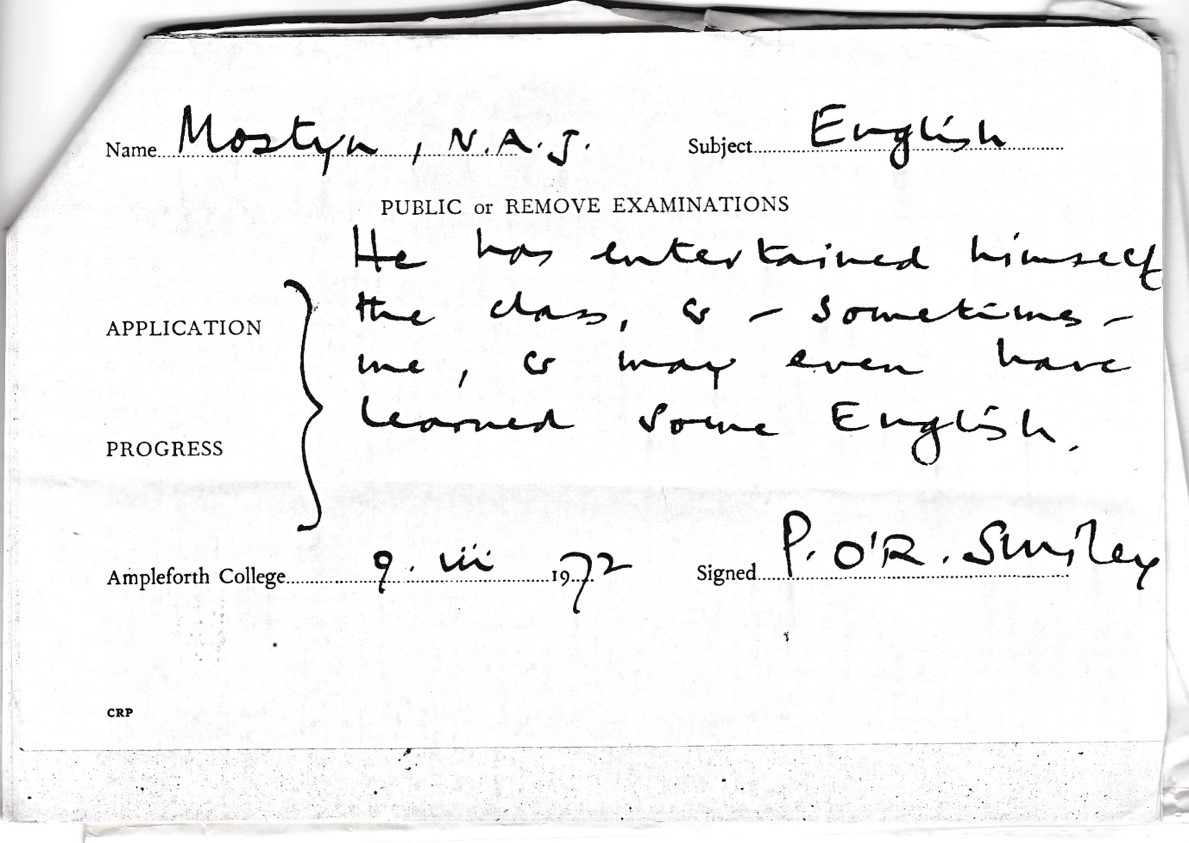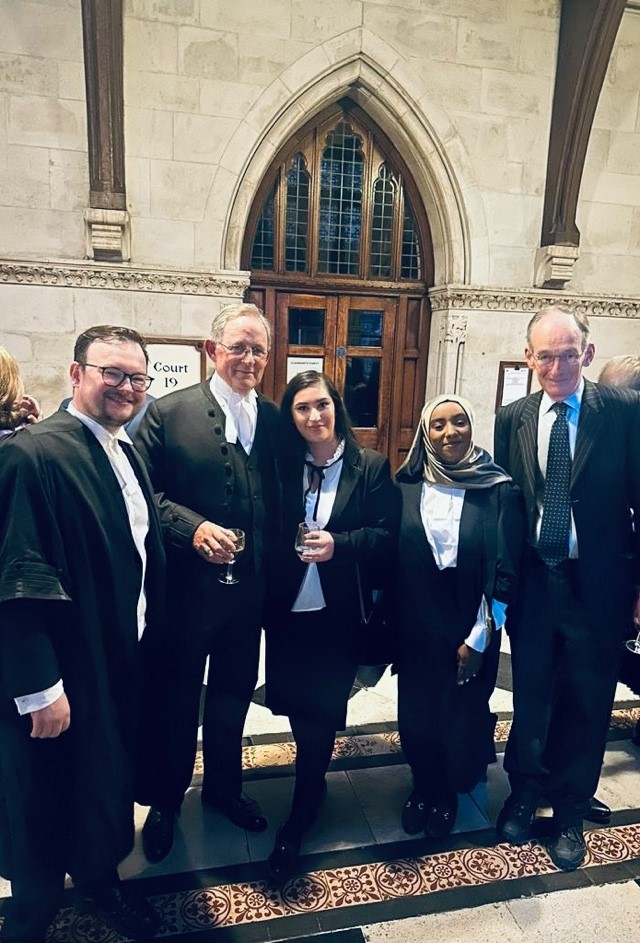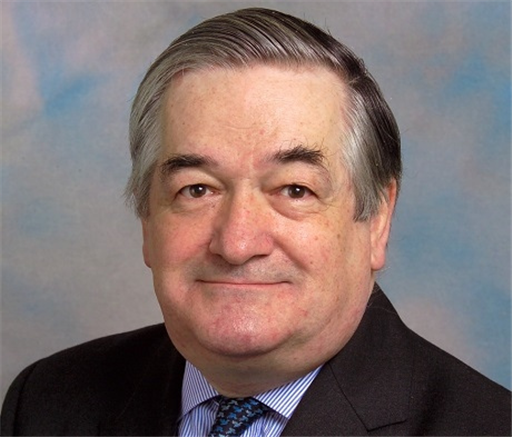
The Valediction of Sir Nicholas Mostyn: The Abdication of the Monarch of the Mountainous Principality of Court 50
Published: 16/10/2023 09:53
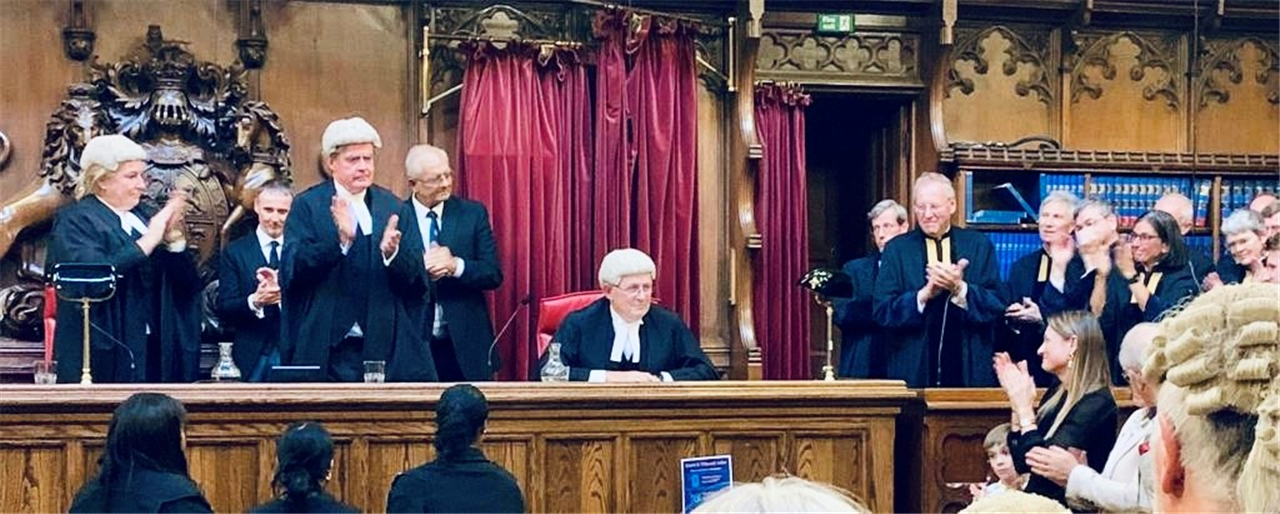
– A standing ovation in the Lady Chief Justice's Court
On 4 October 2023 in the Lady Chief Justice's Court surrounded by family, friends, colleagues (and the Lord and Lady Justices from the ‘dark side’) the financial remedy world said farewell to Sir Nicholas Mostyn, and he to us. Attended by many in person and virtually, it was an occasion to treasure. We are delighted to share the speeches of the Lady Chief Justice, The President of the Family Division, Tim Bishop KC on behalf of the Bar, and Lady Helen Ward on behalf of solicitors, as well as Sir Nicholas’s own parting words. On behalf of all at the Financial Remedies Journal, Sir Nicholas: thank you (and enjoy Taylor Swift!!)
LADY CHIEF JUSTICE, DAME SUE CARR:
Mr Bishop, Lady Ward,
On this very special occasion, it is my simple task to hand the ceremonial reins over to the President of the Family Division. But not without first extending a warm personal welcome to Mr Justice Mostyn’s father, Liz, his children, grandchildren, siblings and friends. And not without adding a few brief words of my own.
Mr Justice Mostyn did his first case at the Bar on 9 June 1981. He presided over his last case as a judge on 28 July this year. Mr Bishop, you appeared before him on that occasion, representing the applicant wife. Mr Justice Mostyn’s final words were as follows:
‘I end by applauding the skill, assiduity, and diligence of all the lawyers involved in this complex case. The written and oral work from the Bar has been of the highest quality. The attention to detail from counsel has been outstanding. … [Mr and Mrs Baker should understand that their interests were represented fearlessly by counsel and that no stone was left unturned in their representation.] It was a pleasure to conclude my judicial career with the receipt of such skilful advocacy.’
Perhaps, Mr Bishop, that was to butter you up for your role today. As they say, flattery will get you everywhere.
I anticipate that we will be hearing much of Mr Justice Mostyn’s erudition, intellect, and fearlessness. That fearlessness shows itself in many different ways. Woe betide the appellate judge who has the misfortune to hand down a judgment disagreeing with Mr Justice Mostyn. You can, I can tell you from personal experience, expect an email by return. He and I will have to continue to disagree, for example, as to whether there is any material distinction to be drawn between the concept of ‘dishonesty’ on the one hand, and ‘want of integrity’ on the other. I am sorry to have to tell him that I now, on any view, have at least the tactical advantage.
But the characteristics which really mark him out as a judge are his warmth, good humour, empathy and humanity. These qualities, crucial for a family judge, are evident not only in his judgments but also in the way in which he conducts himself in court.
I pause to take stock. During his 30 years at the Bar and 13 years on the Bench, Mr Justice Mostyn’s life has been dominated by his work. His cases have, to borrow a phrase from WH Auden, been his North, his South, his East and West. I know that it is now an odd feeling for him to be without them. But I also know that he is looking forward to the next phase, with his family and podcasting amongst many other prospects.
Mr Bishop, we lawyers – in various different ways – often have to explore the concept of cause and effect. The eagle-eyed amongst you will have noticed that this valedictory takes place less than 48 hours since I was sworn in as Lady Chief Justice. I have Mr Justice Mostyn’s permission to make it clear that there is no nexus between these two events, despite their unfortunate chronology.
THE PRESIDENT OF THE FAMILY DIVISION, SIR ANDREW McFARLANE:
My Lady, we meet at what is a bitter-sweet moment for the Family judiciary and, indeed, the community of Family lawyers at large. We are gathered to mark the retirement of Mr Justice Mostyn after 13 years as a judge of the High Court Family Division and, before that, 30 years as a prominent and most successful member of the Family Law Bar.
Unlike many who retire from the full-time judiciary, Sir Nicholas Mostyn is not going to return to sit part-time or undertake private arbitrations. So, this really is it. No longer will the usher in Ct 50 bellow ‘Court Rise’ followed immediately by Mostyn J moving seamlessly from the world of crypt-like predictability that is the judicial corridor, through the doorway and into the maelstrom of life which rises up to meet a Family judge each morning. Equally, no longer will those in Court 50 experience that twinge of excitement as they anticipate learning from Sir Nicholas what, their carefully prepared legal argument, is in fact all about.
Sir Nicholas has come to regard Court 50 as his own fiefdom. Indeed, with characteristic understatement, in a recent article he described himself as ‘the monarch of the mountainous Principality of Court 50’. Well, if monarch he has been, this is the moment of abdication.
In describing this event, I have chosen the phrase ‘bitter-sweet’ for a range of reasons. Parting is a reason for sadness, but there is so much to be thankful for and positive about.
Today is bitter, in part, because we fellow judges are losing a highly valued colleague and a good friend, who was an unrestrained and fully joined up member of the Division from Day One and who has been very much at the heart of the many things that we do, throughout his time in our midst. As a colleague he has been kind and generous with his time, and never shy at venturing an opinion on the rights or wrongs of any issue that is brought to his door.
He has also, for example, been the minute taker for the Family Division judges termly meetings; a much coveted role held by only two other judges in modern times, Sir Robert Johnson, Sir Paul Coleridge, before Sir Nicholas. The term ‘minute’ is not to be understood in its normal sense. The record produced of each meeting has much more in common with the ‘St Cakes School’ page of Private Eye, rather than Hansard. Sir Nicholas has spent many hours developing this rich satirical vein, introducing cameo – and much doctored – images of his fellow judges, and referring throughout to the President of the Family Division by the wholly accurate description of ‘our Supreme Leader’.
In this role, as in so many others, we will all greatly miss you Nicholas, but your well crafted words and phrases will live on.
And that is undoubtedly so in the altogether more important field of the law itself. Here there is so much to look back on with gratitude and satisfaction. It is, I think, right to describe your life’s work, both at the Bar and on the Bench, as being the most significant single contribution to the development of the law and practice relating to divorce and financial provision in my professional lifetime. The Family Bench and Family law is bidding farewell today to one who has been a Titan in our world for over four decades.
The ‘sweet’ side of this afternoon’s balance is that there is so much from the past four decades to celebrate and be grateful for.
You, Nicholas, demonstrate intellect of the highest order, which is combined with a thorough understanding and knowledge of the law and its historical origins. Your quick wit, masterful command of the language and an ability to use it to maximum impact made you a most formidable advocate. Your vigorous, one might almost say ‘Tiggerous’, pursuit of arguments rendered them hard to resist. On top of all that, you were also able to add up – a skill not universally exhibited by Family lawyers. You were computer literate from the earliest of times and at the forefront of adapting computers for use in family money cases. I recall you visiting Birmingham over 35 years ago to demonstrate how something called a ‘spreadsheet’ might be useful in court.
With this cocktail of talent and skills, you were ideally placed to be at the vanguard of many of the developments in the financial remedy world both at the Bar and, now, on the Bench. Mr Bishop may speak about the range of initiatives that you with others dreamed up and took forward, including the inspired creation of At A Glance. But I wish to dwell on the establishment of the Financial Remedy Court, as part of your lasting legacy as a judge.
Prior to the initiative that you started, some 7 or 8 years ago with the encouragement and leadership of Sir James Munby, Family ‘money’ cases were normally listed before any district judge, or deputy district judge, whether or not they had experience in the field or interest in the work. The result, from the perspective of the profession, was of a form of lottery, where the quality and experience of the tribunal was unknown until the hearing commenced. Equally, and in contrast to the position that had been established for those hearing children cases, there were no universally accepted protocols for how the work was to be undertaken, with different local practices being followed in different courts. Further, other than in the loosest sense, there was no established leadership or internal communication forum for financial remedy judges.
Your vision, and it was YOUR vision, was for the establishment of a Financial Remedy Court, within the Family Court. With characteristic energy and vigour, you developed this idea. The ‘court’ became a reality in 2018 and, after that, you as its ‘supreme leader’, most ably assisted by HHJ Edward Hess, HHJ Stuart Farquar and others, promulgated the various constitutional and practice documents that have done so much to bring your idea to life. You also became a most valuable member of the Family Procedure Rule Committee and, eagle-eyed as always, you developed a relationship founded on strong mutual respect with the key civil servants who support the committee’s work.
You have now passed over these leadership reins to Mr Justice Peel. They are in safe hands, but it is to you, Nicholas, to whom we look with true gratitude for all that you did to create and deliver this very significant improvement to the court’s ability to engage with this important work.
As legacies go, that is not a bad one to be able to claim, but your true legacy as a judge lies in the very many judgments that you have delivered – I know that you know the precise number and that you will undoubtedly share it with us shortly. It is within these judgments that a reader will find, and will continue to find, the output of a mind that is constantly fascinated by the law and keen to develop it to meet the needs of justice in an ever more complicated world.
Robert Peel says that:
‘[i]n the field of financial remedies [Nicholas Mostyn’s] judgments are the “go to” decisions for judges on just about every corner of FR work: sharing, compensation, needs, freezing injunctions, interveners, interim maintenance, non-disclosure, conduct, costs, nuptial agreements and many more.’
More generally, you have led on the ‘Standard Orders’ project to develop from a standing start a suite of template orders for every category of Family Law application.
It is also right to record that it was Mostyn J who, when Covid struck, undertook a full five-day Court of Protection hearing in, I think, the 2nd week of lockdown. At that time there was understandable doubt over whether such a thing could successfully be achieved. It is now widely accepted that the Family Court led the way during the pandemic in conducting remote hearings and I do not think that it is unjustified to say that your initiative did much to encourage us all to follow your lead.
The loss of such a dynamic and valuable individual from the High Court bench is a sadness. Of the many and various contributions to our world that Sir Nicholas has made, there will be no more.
It is, of course, also a sadness that this glorious progress is coming to an end prematurely as a result of the onset of Parkinson’s Disease. It is a tragedy for any person to be struck by this insidious condition, but it has greatly saddened us all to see someone with so much vim and drive, and with so much more to offer, fall under its spell. But, if the disease expected you simply to fall down, curl up and quietly accept your fate, it could not have been more wrong. With determination, intelligence, ingenuity, effective medical treatment and the support of Liz and others, you have shown just what can be achieved to meet the condition’s debilitating symptoms. Your courage, both physical and moral, in addressing this most unwelcome turn of events has been so impressive. With the assistance of a series of excellent judicial assistants, your output as a judge has, if anything, increased. Your positivity and omnipresent good humour have demonstrated the extent to which you have not let being a ‘Parky’ diminish you. The way that you have responded to the disease is greatly admired by all, not just in our small world, but far and wide via ‘Movers and Shakers’ the ground breaking Podcast that you and others have created and produced. This brilliant combination of well-informed, frank discussion, interwoven with rich humour and the occasional perfectly placed profanity has been such a success. Your fellow Movers and Shakers are here this afternoon, you and they will know, particularly from the sell-out live event you arranged in Middle Temple in September, just what a lifeline this series has been for those affected and for those close to them.
You are not retiring today because you have been defeated by Parkinson’s, au contraire My Lord, you are going at your own time, on your own terms, and with your head held high.
With my tongue firmly in cheek, I can identify another bitter potential consequence of your retirement, namely the mass redundancies or redeployment that must now be visited on the Family team in the Court of Appeal, who have been kept so busy marking your homework over recent years. You and the LJ’s have not seen eye-to-eye at all times but such professional differences have not diminished the quality of the respective personal relationships involved.
Lord Justice Peter Jackson, in the Nicholas Wall Memorial Lecture earlier this year, paid public tribute by acknowledging your ‘signal contribution to English family law with admiration and respect’. This same Peter Jackson LJ recently sent me an email which reads as follows:
‘Nicholas’ retirement has been noticed beyond the confines of the Family Division. Tributes have been paid to him by the Institute of Legal Archaeology and by the Worshipful Company of Small Dog-owners.
The Royal and Ancient Golf Club is piloting an especially wide fairway in his honour. But one contribution which has just come to my attention is that of the Royal Horticultural Society, which has named a rose after Nicholas. Here is the citation:
Rosa Mostynia Floribundia Semper-virens (‘Young Nick’). Propagated from a cutting from Wilsonia Suprema (‘Old Nick’), Young Nick has become a favourite with all who enjoy adventure in the garden. Expect exuberant growth and vigorous blooming in all seasons. Has a tendency to ramble and is highly resistant to pruning. Exceptionally tolerant of frost from above, which, unlike in other species, tends to stimulate further growth. Admirably hardy in adverse conditions.’
I speak for all of the judges of the Family Division, for the Family specialists in the Court of Appeal, for the judges of the FRC and many, many more in expressing gratitude and respect for all that you have done to contribute to, and improve, the law and its practice in this important field. We are bidding farewell to a most generous and valued colleague and friend. We will miss you, but we wish you, Liz and your family well for all that now lies ahead and for great happiness in the years to come.
– The Chancellor of the High Court, Sir Nicholas Mostyn, The Lady Chief Justice & The President of the Family Division
TIM BISHOP KC:
My Lady,
With your permission I will address these remarks to My Lord Mr Justice Mostyn.
We have come here today to bid farewell to one of Family Law’s greatest sons, perhaps the greatest of all. For who has given more to Family Law than Your Lordship? Who has done more to advance the understanding of principle and the efficiency of practice in this vital field of law which touches the lives of so many in our country? No one. Your Lordship’s contribution as barrister, judge, reformer, author, lecturer, computer expert and international ambassador has been without equal. Truly, like Augustus, you can say that you inherited a city of brick and left one of marble.
The start of Your Lordship’s story is legendary. A university career misspent cavorting, giving little hint of the scholarship which was later to become so clear. Your Lordship was booted out of chambers at the end of pupillage but, in a reversal worthy of Dick Whittington, you were summoned back by Joe Jackson after a change of heart. And so it began: an ascent so steep as to make a meteor blush. Solicitors heard of a young barrister who had it all: a piercing intellect, numeracy, diligence and a suite of oratorical gifts capable of enchanting the most barnacled circuit judge. The stampede for your services began. Soon you were the doyen of the juniors, often seen in a brilliant alliance with Nicholas Wilson. You took silk precociously at 17 years call and before long you were the number 1 brief in the land.
You were there at the birth of the sharing principle, part of the debate in the House of Lords in White. And in Miller, and in Radmacher, and in Lambert and in Parlour and in countless other decisions which have shaped the landscape. This country could not contain your talents. You blazed a trail to Cayman and to Hong Kong, and there you became known for your expertise and your extraordinary ability to win cases.
Perhaps Miller stands out as a genuine highlight. At the end of day 1, we were in trouble; ‘a bouncing ball and a blighting light, an hour to play and the last man in’. Overnight with me and Rebeca Bailey Harris you devised a fresh set of submissions to meet the challenges from day 1, you plotted the path to victory. And by the end of day 2 you had all five of them sitting on your knee, hanging on your every word, like eager children willing a bedtime story not to end. As I said to Richard Sear, then my pupil, ‘remember this day, for you will not see advocacy like that again’.
Of course, amidst the glow of Your Lordship’s skills, there were occasional lapses, the odd toe of clay. If Your Lordship had a flaw, it was perhaps the intermittent shortcoming in Your Lordship’s client care skills. I recall the occasion when with Fiona Brown we travelled down to work on some documents with Sir Paul McCartney at his country home. After several hours work, Sir Paul offered us a guided tour of the many pieces of immortal memorabilia in his fine house. As we approached one item, Sir Paul’s steps slowed as if approaching a holy site. Reverently he said, ‘and this is the guitar on which I composed Yesterday, my greatest achievement’ to which Your Lordship replied ‘really, I thought that was one of Lennon’s’. Before adding, ‘well no matter, for me music died in 1883 with the death of Richard Wagner’; all of which disappointed the great Beatle somewhat. Of course, this was before Your Lordship discovered the one true genius to eclipse them all. I refer of course to Taylor Swift.
When Your Lordship confided in me in 2010 that you had applied for a High Court appointment, I knew that Your Lordship would seek to address some of the thorny issues that have preoccupied us all in this field. Perhaps even half of them. How very wrong I was. During the past 13 years Your Lordship has given judgments which clarify and modernise virtually every aspect of law and practice in relation to financial remedies. I won’t reel off the dozens of important cases which Your Lordship has decided. But perhaps UL v BK stands out as an example of what Your Lordship was all about. The judgment is replete with scholarship drawn from both our division and others. But it is also all about justice: Your Lordship simply could not look the other way when it came to the pernicious injustice of unwarranted ex parte applications. Learning and Justice. That is what Your Lordship brought to your work on the Bench. That is what we all came to expect as we walked into Court 50. And your objective was always the same: to craft principles which enabled more cases to be settled more easily with less expenditure on cost. The body of case law which Your Lordship has left us, will guide the application of the sharing principle and the assessment of needs for years to come.
Additionally, Your Lordship effected profound reforms of the practice of family law as the President has outlined. Your Lordship’s efficiency statements were frequent and bracing. Your Lordship assembled and stocked the wardrobe of precedents for our orders. You have achieved real modernisation and real improvement. One day we may even forgive you for ES2, in unpopularity perhaps the evil twin of HS2.
Your Lordship’s instinct to reform is of no surprise. For very many years, the desire to educate and modernise was evident from Your Lordship’s remarkable output as an author and creator of computer programmes. You were the founding father of At A Glance and you have been its chief custodian over the past 30 years. And then came Child’s Pay and Capitalise, and Quantum and Financial Remedies Practice. None of these vital titles would have been created without Your Lordship.
Your Lordship often created these works with others, illustrating another of your great attributes: the love of collaboration. You had a unique ability to draw out the strengths of others and combine them with your own. At the Bar you were a brilliant leader a joy to work with: just ask any of your regular juniors, particularly Liz Clarke. You created the template that we are all attempting to follow. The 8 years period which I had collaborating with you on cases great and small was the honour of my professional life.
To have achieved all this in the past 43 years would have been remarkable for a man with no hinterland or other interests. But Your Lordship also maintained a huge life outside the law. It is perhaps not surprising that a character so large requires two football teams to support. Lady Ward will, I know, say more about, Your Lordship’s life away from work.
– Photo reproduced with kind permission of Charles Hale KC
I would like to pay especial tribute to Your Lordship’s fantastic wife Liz who has provided you with such joy and support for the past dozen or so years. Together, you are the ultimate family law power couple, the Posh and Becks of divorce if you like. But I know that much of the energy to achieve so many things in life has come from the happiness and security which you have found in your loving relationship with Liz.
Indeed, the lustre of Your Lordship’s achievements becomes brighter still when considered in the light of various setbacks and challenges which you have faced. You were badly shaken by the loss of your great friends Val Le Grice and Peter Singer and the tragic incapacitation of Martin Pointer (with whom you have loyally remained in contact over the past six years). You have come through a divorce, painful both for Your Lordship and Lucy. And more recently Your Lordship has had to cope with the wholly unwelcome arrival of Parkinson’s Disease as mentioned by the President. A lesser man would have yielded to misery and have allowed this development to overshadow everything else. Not you. Your Lordship is allergic to self-pity. You have even turned your condition into an opportunity to advance public consciousness and engagement through your brilliant movers and shakers podcast and the work that is yet to come.
Tomorrow Family Law will continue. One only has to look around at the calibre of young solicitors, barristers and, indeed, judges to feel confident that the future is in safe hands. But it will continue without Your Lordship. And therefore it just won’t feel the same. We will have lost our talisman, our centre-forward, our ambassador, our brightest and ablest star.
We wish you great success with the five thousand things which you have planned for your so-called retirement. Please, above all, take care of your health. And I would like to conclude by simply saying, on behalf of us all, thank you. Thank you for everything you have contributed. Thank you for all you have done. It was magnificent.
LADY HELEN WARD:
My Lady,
It was an honour for me to greet my Lord, Mr Justice Mostyn, on behalf of the Solicitors’ profession upon his appointment to the High Court Bench. I recall the occasion was marked by an affectionate gift from one of his most devoted instructing Solicitors, Mr Raymond Tooth. He gave him a block of wood which he invited him always to place before him on the bench. It was engraved with the words ‘SHUT UP’. Somehow… somehow, it has been hidden from view for these past thirteen years, but we are all the better for that.
And now I am privileged and honoured to be chosen by you, my Lord, to participate in your valedictory, as your friend. My words are spoken from the heart.
You and I go back a long way. You were a pupil to the late and much missed Peter Singer. I was two years qualified. We met in conference in Peter Singer’s small room in Mitre Court. While your pupil master gave his advice, you were swinging backwards on two legs of a chair positioned in front of your small desk, while reading a newspaper. I felt sure you were going to fall backwards, almost into my lap. I was entertained by your balancing act, your disinterest in the case and I rather sensed your pupil master was too! It was difficult at that time to forecast how the career of that insouciant youth would blossom, but you made me laugh then as you have so often for more than 40 years.
I had the privilege of instructing you during your sensational, intergalactic career at the Bar. There were many funny moments, although they did not obscure the disciplined, conscientious, creative, and cerebral preparation of your cases.
Your career has been described and applauded by My Lord, The President and my Learned Friend, Mr Bishop. May I amplify some aspects briefly.
You are a creative and imaginative person, although I am aware you describe yourself as a mathematician and statistician. This was recently demonstrated by your foreword to the 2023 edition of the Dictionary of Financial Remedies which reads as follows:
‘As before I have amused myself by getting the computer to tell me how many times I am mentioned. In 2019 it was 94 times; in 2020 in was 97; in 2021 it was 111; in 2022 it was 135 and this year I am pleased to record that the figure has risen to 151. Again, I have further amused myself by having the computer tell me how my competitors have fared this year. The results are even more pleasing than last year.’
You go on to record that your nearest competitors can muster only 33, 31 and 29 respectively.
I believe you worked out that the word count on your judgments is the equivalent to writing War and Peace every other year, a task beyond Tolstoy. It took him six years to write War and Peace.
Your creativity stretches far and wide.
You created the first Duxbury Programme on a spreadsheet on Framework 2.
The publisher of At A Glance described you ‘as a renowned and experienced computer program deviser’. You are the author of Child’s Pay, Capitalise, Quantum Hop, Skip and eventually jump to the Cloud!
Your phenomenal hard work and high intellect have resulted in the improvement and clarification of Family Law practice and procedure and have significantly contributed to the development and expansion of the jurisprudence.
I was interested to read recently that you expect Artificial Intelligence is going to play a significant part in the practice of law, particularly in relation to the solicitor’s role. Indeed, you state that ‘All the dross which solicitors currently have to do, such as writing letters, will be got rid of.’ Your use of the word ‘dross’ reminded me of an occasion when you expressed a similar sentiment. Mr Paul Coleridge QC, you and I were visiting our client’s castle in Kent. There was fashionable rush matting on the floor with which Mr Coleridge was not familiar and in his inimitable charming way enquired of our client about it. You proffered your view sotto voce. Your leader roundly rebuked you, ‘Shut up Mostyn, of course it is not reconstituted solicitors’ correspondence.’
Your judgments are innovative and educative and recognised as such, including by members of the senior judiciary.
In June 2023 Lord Stephens in the Supreme Court described a judgment of yours as ‘Magisterial and potentially seminal’.
I have permission from Lord Neuberger, to quote his words to you on your retirement:
‘Very few Judges write judgments which contain the combination of intellectual power, originality of thought, and clarity of expression which yours regularly achieved (although I cannot pretend to have read all 323). Your forthrightness offended the more timid judges and I think it occasionally went further than was entirely prudent but to some readers (including me) that was a plus rather than a minus – even when I was being trashed. So you will be much missed.’
Sir James Munby describes you as follows:
‘Mostyn J never sought to ascend to the higher reaches that his vast knowledge, high intellect and tremendous industry would more than have justified. Dare one say his wise choice has immeasurably benefited us all. As the outstanding Puisne Judge of his era, he has achieved much more- and much more of enduring importance-than many who have risen much further.’
Your judgments contain elegantly crafted and witty prose. I particularly like this example:
‘There is no doubt that in the world of judicial review proportionality has advanced like a cuckoo, occupying the common law nest of traditional assessment, laying its continental eggs in it, and ejecting its home incubated Wednesbury hatchings.’
Your judgments contain quotes from Gilbert and Sullivan, Shakespeare, Byron, Kipling, among others, as well as refer to historic texts and learning.
You have made a much-admired contribution to The Administrative Court, which I know you greatly enjoyed. Indeed, you say your proudest moment was the decision you made in the Administrative Court, quashing a statutory instrument, the Personal Independence Payment, on the grounds that the express exclusion of those suffering psychologically was discriminatory. Your decision reduced many to tears and made a significant improvement to the lives of hundreds of thousands. In the House of Commons the Minister admitted that the government was very disappointed and had been advised by top lawyers that the decision was entirely wrong but there would be NO APPEAL.
Your distinguished career on the bench and your exceptional bravery, are universally acknowledged and utterly self-evident.
Listening to us extol your illustrious career might mistakenly lead to the assumption that the law defines and consumes you. This is not so. There are many in this Court whose lives have been touched by your generosity of spirit, your interest in others, your warmth and good humour, your gift of loyal friendship. It is well recognised that you are always willing to advise, to offer support in celebration and in tragedy, as I have personally experienced.
I anticipate you will continue to indulge your love of music, although I was perplexed to learn Mr Bishop believes that your passion for Wagner has been eclipsed by Taylor Swift. I understood ABBA with their song The Winner Takes All to be at the top of your list! BUT I know your love of the music, familiarity with every note and scholarly understanding of Wagner’s Ring Cycle is your true passion. We left a performance of Das Rheingold recently and you told me the last note of the horn was off; I believed you!
You will walk Bilbo, your much-loved Dachshund, play golf, ski and would not miss a test match at Lords accompanied by your family and friends. You greatly enjoyed with the youthful Lord Carnwath, joining the Geriatric Judges in their weekly tennis match in Lincoln’s Inn Fields when one of them was crocked (which regularly happened). Characteristically, you did not just play tennis, you created a tennis club, now LTA registered, for many enthusiastic players, all ranked in a complex ladder which I am told only you understand!
It is no surprise that it is you who conceived of the idea that resulted in the podcast ‘Movers and Shakers’, which deals with various aspects of living with Parkinson’s disease. It has an outstanding record number of hits throughout the world and received wide media coverage. One can hear how you infect the other movers and shakers with your enthusiasm and good humour. In a recent article in the Observer I read that the other 5 ‘Parkys’ as you affectionately call yourselves, acknowledge and I quote ‘by unusual universal agreement … it was the Judge, Mostyn, who provided the initial spark for the chatter and who does most to keep it all going, coordinating diaries, coming up with topics’.
Rory Cellan-Jones says of you and I quote:
‘He is interesting, the Judge, the opposite of stereotypes. We are supposed to be the creative types, but all the ideas come from him. He called me at 6.30 this morning, which happens quite often. He had three enthusiastic suggestions, two of which I could happily tell him were bollocks.’
You have ideas and ambition for Movers and Shakers’ progress. You intend to raise funds to support the advancement of medical research into Parkinsons and have already started to do so by cycling with members of your family and others from England to Holland. It is your wish to keep alive the growing awareness of the nature of the condition and to work with others to raise money to help the vast number of people who are shattered by their prognosis and completely alone.
I entirely agree with Mr Bishop, your early retirement in consequence of being affected by the illness has not resulted in a moments self-pity. On the contrary, you are selfless, determined to help others and to enjoy your life to the full, which includes aiming further to lower your handicap to qualify for the Parkinson’s Golf Open.
Your family is here. You have four wonderful children, Henry, Daisy, Gregory and Charlie. They and your gorgeous grandchildren are the beneficiaries of your nurturing and your love. I was thrilled to be asked to be Charlie’s godmother. As we crossed the threshold of the Catholic church in St John’s Wood for Charlie’s Christening, I was feeling, perhaps understandably, a little nervous. You placed your hand on my shoulder and whispered, remember this is like the Chancery Division, one wrong move and the whole thing will be void ab initio.
The children and your grandchildren are close to you and your darling wife, Liz and spend a considerable amount of time with you. Liz has brought love and laughter into your life. She has many exceptional qualities, including her powerful intellect. Her instinctive care and concern for others, kindness, loving embrace of your children and her role as glammy to your grandchildren, oh yes and it would be remiss of me not to refer her ferocious cross court forehand and mean drop shot, shall all contribute to the very happy times you will enjoy in retirement.
Finally, I must mention THE LAST HURRAH. This is a video of the utterly hilarious dance routine which you and Tony, your clerk, performed in July on your last sitting on circuit in Swansea. You are wearing identical black T shirts bearing the words LAST HURRAH on the front and MOSTYN J FINAL TOUR Swansea on the back. Morecombe and Wise style, you performed your synchronised backwards and forwards dance routine to the song Bring me Sunshine (while attempting to supress your giggling) and then skipped together through the drawing room and out of the door waving farewell.
We in this Court wish the sun to shine on you and Liz in your retirement.
– Sir Nicholas Mostyn’s address & His Lordship’s captive audience
SIR NICHOLAS MOSTYN:
My Lady. Never before has a valedictory been presided over in this jurisdiction by a female Chief Justice. I am deeply honoured not only to be playing my small walk-on part as history is made, but also to have received such kind and ill-deserved plaudits from you.
A little while ago you emailed me to ask that I should not say anything polemical or critical about the justice system in my final address. And of course, I shall not do so because it is working perfectly … apart from some minor problems with the Court of Appeal.
I’m sure that with your legendary efficiency you will be able to sort them out and get everyone back on message.
My Lord, President, I am honoured and touched by your remarks, some of which may even be true.
Mr Bishop and Lady Ward. We go back a long way. We have done some fabulous cases together. We are close friends. I am touched to the core by what you have said, particularly by the bits that may have a grain of truth in them. I will remember each speech for a long time.
In the course of the last couple of weeks I have been clearing out my room here in the RCJ and have come across documents stretching back to my school days. I found two reports from December 1971 and March 1972 from my English teacher at Ampleforth which I shall read out to show that nothing has changed in over 50 years.
My education culminated in 3Bs and a 2.2. Of which Liz does not hesitate to remind me if she feels a bout of judgitis coming on.
Anyway, in spite of these unpromising beginnings I was taken on as a pupil by Jospeh Jackson in 1 MCB in October 1980 and remained in those chambers for 30 years until I left in 2010 to become a judge.
Another document I found was the script for the speech I gave when I was welcomed as a newly appointed judge on 14 April 2010.
I am not going to repeat the thanks I expressed on that occasion to everybody who had helped me to get onto the bench. But I am very happy to see here today so many old friends from those days at the Bar, in particular my principal mentor Nicholas Wilson, my pupil master Bruce Blair, and my old clerks Steve McCrone and Richard Beams.
I do however sound a momentarily sombre note to record that there are, sadly, certain people absent today who were there in April 2010 and who are sorely missed: I am referring to those who have died: my mother, my brother Giles, and to Nicholas Wall, Peter Singer and Val Le Grice; and I also refer to Martin Pointer who cannot attend today on account of the terrible injuries he suffered in a motor accident.
But my father was there then, and he is here today. Aged 90 and still flying your vintage aeroplane. An amazing achievement.
I am delighted that all four of my children are here. Back then none of you were married. Now two of you are and one is engaged, and I have four grandchildren with another en ventre sa mere (as we say – more judgitis?). It is wonderful to see two of you here: Inigo and Viola.
It is also wonderful to see here four of my siblings as well as a number of aunts, uncles and cousins.
Addresses like this are always a bit like Oscars speeches, but it is important that I publicly recognise those who have been so supportive of me during the 13 very interesting years I have enjoyed on the bench.
So do bear with me. Unlike an Oscars speech they can’t turn me off.
I would first mention the three Presidents under whom I served. The first was Nicholas Wall, an absolutely lovely and supremely gifted person, but he had to resign on account of ill-health in Summer 2012, so my period of service under him was short.
We then received as President Sir James Munby, who sadly is laid up with a slipped disc and cannot be here, although I believe he is watching the live stream.
Now it is well-known that in the course of a certain case, in an appalling error of judgment, I made some disobliging comments privately to my client about the trial judge, Mr Justice Munby – which my client later published. It might be thought that this would have given rise to a certain froideur between Sir James and me. Far from it.
James: not only have you been exceptionally generous in your remission of my conduct but for some inexplicable reason after your appointment you trusted my judgment sufficiently to give me some important roles.
You gave me the job straight away of being the judge in charge of the High Court ‘money’ list. Which led to the snappily titled ‘Statement on the Efficient Conduct of Financial Remedy Final Hearings Allocated to be heard by a High Court Judge’. Which remains in force and, sometimes, is even complied with.
You then gave me the job of being judge in charge of the Orders Project, whereby a precedent would be created for every type of Order used in Family Proceedings. This was a Sisyphean labour but was eventually completed in 2018.
In January 2018, you then made me the National Lead Judge for the proposed new Financial Remedies Court which you were determined to bring onto existence despite quite considerable opposition. Just 3 years later on 24 February 2021, after extensive piloting, your successor was able to announce that the FRC was an established and permanent part of the Family Court. Two years on I am pleased to see it prospering under the wise leadership of Peel J.
Your support for me has been unwavering and you have become a very good friend.
You were forced to retire in July 2018 on reaching the then statutory retirement age. The minutes of the judges’ meeting in April 2018 state:
‘Baker raised an item of AOB immediately. This was TEPOR’s last ever meeting! The lamentations endured for hours. Robes were rent, teeth were gnashed, copious tears were shed. Between gasps and gulps Baker paid tribute to 5½ years of magnificent leadership. A movie will be made which will make Lincoln look like kindergarten stuff compared to the feats it will portray. Getting through the revision to PD27A plainly knocks securing the passage of the 13th Amendment into a cocked hat. ……(cont page 94)’
The acronym TEPOR needs some explaining. The minutes of the September 2014 meeting state:
‘TEPOR is the acronym for The Eternal President of the Republic, the title bestowed on Kim Il-sung by the adoring populace of North Korea. It seems very suitable for adoption by our beloved leader. ‘
And so it was.
I look forward in retirement to continued lively exchanges with you by email and, perhaps, we will join forces on matters about which we feel strongly – did someone mention secrecy in money cases?
Finally, from August 2018 I have had the good fortune to serve under you, My Lord President. The minutes of the October 2018 meeting record:
‘We [enthusiastically] / [adoringly] / [ecstatically] / [sincerely] / [keenly] (delete as desired) welcomed our new shepherd, guide, leader and pastor Sir Andrew McFarlane (that’s quite enough adulation, Ed).’
My Lady, the President placed me onto the Rule Committee in February 2019, where I like to think we got some important rule changes through. Unfortunately, time does not permit me to explain the overwhelming excitement experienced by all in designing the new Form D81 and the rewriting of Practice Direction 5C.
My lady, there is no disputing that the last five years have been very challenging for the PFD and he has navigated the storms with great adroitness. It has been a pleasure to serve under him.
The Family Division is a very friendly place, and it is invidious for me to pick out specific judges with whom I have worked in one way or another over the last 13 years. Of course, during that period we lost a lot of serious talent. The minutes record with regularity the departure of so-and-so to the dark side (as the Court of Appeal is customarily referred to). But one person who we did not lose to the dark side was James Holman. On your appointment, my Lord, to the Court of Appeal in July 2011 I was able to take over your room and courtroom and become James’s next-door neighbour. He became a very close friend and was an invaluable mentor from 2014 onwards when I was appointed to sit in the administrative court.
It was at that point that I was able to establish myself as the monarch of the autonomous mountainous Principality of Court 50. There I happily reigned largely undisturbed until this July. I say largely undisturbed because there was the odd temporary occupation of the Principality’s territory by the regional power bloc but in each instance a combination of diplomacy and dogged resistance allowed, after a suitable pause, full sovereignty to be resumed.
The judge I would wish most to thank for her unwavering support since my diagnosis in May 2020 is Mrs Justice Lucy Theis. In combination with Steve Blackmore of the judicial office they have enabled me to carry on working more or less at full throttle churning out around annually about 300,000 words of judgments. That’s about half a War & Peace each year! They have done that by providing me with a full-time judicial assistant and insisting that I only work a four-day week and recharge my batteries on day five. I do not believe that these adjustments would have happened without Lucy’s insistence and persistence.
It is in this context that I mention my neurologist Prof Ray Chaudhuri. He is one of the top Parkinson’s neurologists in the world and I am so lucky to be under his care within the NHS. He has devised a combination of medications for me which has significantly abated my tremor and thereby facilitated me to do my cases efficiently.
I sense that the Court of Appeal would be interested to know what are the recognised side-effects of those medications you have prescribed for me.
My first Clerk of the Rules was Carolyn Bowstead. I remember her showing me around the day after I’d been appointed. She took me into a room in which there were thousands of files and told me ‘this is where the dolls are kept’. I imagined she was talking about the anatomically correct dolls used in the Cleveland enquiry. But no, she was talking about deprivation of liberty cases, about which I knew absolutely nothing. For that has been the other fascinating aspect of this job: At the Bar I was a specialist in big money cases, but I knew more or less nothing about Private Law, Hague, Public Law, Deprivation of Liberty, let alone all the mysterious things going on in the Court of Protection and the Admin Court. Learning all this stuff from scratch has been really interesting both for me… and the Court of Appeal.
From the office I would just wish to mention Sinead who always bends over backwards to make life as (I won’t say easy, but) as least hard as possible.
Of the ushers and associates I have to mention Maureen Scott. She said to me soon after I had taken over my current room: ‘this is a lucky room as everybody in it gets promoted...’ I must’ve been the exception that proves that rule. She was a brilliant usher, managing to get everybody organised and calm by miraculous feats.
I was superbly looked after while out on circuit. I must mention Sharon Roberts the manager at Swansea, which I visited a record 14 times, whose care of me was superb. I will miss my visits to Fairwood Lodge very much. They were, as they say in that part of South Wales: ‘Cow’in Lush!’ which Professor Oliver Quick tells me is local dialect used to describe something that is particularly amazing or attractive.
Since my diagnosis in May 2020 I have had six wonderful judicial assistants: Holly, Henrietta, Harry, Jake, Fatima and Safia. When Safia appeared on the Movers and Shakers podcast and on Law In Action, and explained what she did, there was some not entirely jocular speculation that I was left to do virtually nothing!
The assistance of my JAs has been invaluable.
The person who has been possibly the most influential during my time here has been my clerk Tony. I inherited Tony from Bennett J and I was extremely fortunate to have him as clerk throughout my judicial career. He is a superb clerk and knows every trick of the trade. He was an impenetrable barrier between me and the litigants, and a great support to me at all times. Thanks to him I was enabled to do my job to the best of my capacity. But I would also wish to mention Kelly, who was Holman J’s clerk for many years and became a very good friend of Bilbo, my small, noisy, imperious miniature dachshund. Bilbo would not have tolerated being carted daily on my bicycle to the RCJ had he not correctly apprehended that he would soon be cosily sitting on Kelly’s lap being fed treats.
I’ve mentioned the diagnosis of Parkinson’s which I received in May 2020. As a result of our shared condition, which I have described publicly, I have made five fabulous new friends Gillian, Rory, Jeremy, Mark, Paul and I am delighted to see you all here except for Gillian who is watching on the video from Corsica.
We have gone on with our extremely gifted producer Nick Hilton to make the podcast Movers and Shakers. Being involved in the podcast has been a very humbling experience for me. Of course, in my autonomous domain of Court 50 if I started talking, everyone stopped. That deference has not transferred to the podcast at all. And it’s certainly been a first for me to be told in a public setting, and broadcast to the nation ‘Oh Do Fuck off Judge’… although it is probably true to say that the Court of Appeal has thought that.
My Lady, I was only able to participate in the podcast by virtue of the kind agreement of your predecessor Lord Burnett and of my lord the President. Never before had a serving judge been allowed to do anything like that. Last April we had the customary plenary meeting of the High Court judges presided over by Lord Burnett. It was my last such meeting. The podcast was up and running by then. The Chief opened the proceedings by saying that he wished to mark my forthcoming departure and to record that I had done well to increase public awareness of this nasty condition; indeed, he said, ‘Nicholas it’s the best thing you’ve ever done.’
What about my 320 published judgments I wondered to myself!?
I have been asked many time what I am going to do in retirement. I believe that I can speak for all of the Movers & Shakers when I say that it is our intention to carry on doing it until we run out of things to say. It is very uplifting to receive emails like the one we got yesterday from a lady in Northern Ireland:
‘The podcast is the most important part of my treatment. It is a total life line and makes the whole thing tolerable. Saturday morning is the highlight of my week. Never stop making this podcast.’
As for the future generally: some of you may have noticed my recent embrace of modern vibes, and I shall deal with what fate throws at me in that spirit. I am confident that I will find outlets through which to channel my ‘main character energy’ and that I will not any time soon deteriorate into a ‘non-playable character’. Those of you of a certain age who have no idea what I am talking about (I am mainly referring to you lot in the CA) should ask your grandchildren or look it up on the internet (assuming you know how to do that). In terms of my modern credentials I disclose that I am a recent Taylor Swift convert – a Swifty – able to do the plank for the entire duration of Anti-Hero and the proud possessor of tickets to see her in concert in Scotland next year, and no My Lady you may not have them.
Finally, and I have been warned that it is dangerous to deal with this at the end, because of the risk of waterworks, but I do want to say that I could not have done this job over the last 13 years, and most especially over the last 3 years since the diagnosis, without the constant help from Liz who is in my opinion the most amazing person I could ever have hoped to meet. But the past is the past. I now have to face a somewhat uncertain future. Parkinson’s is hilariously described as a ‘progressive’ neurological condition. What this means is that the disease only progresses in one direction and that there is as yet no cure.
The reason I’m retiring early is because I want to give myself the best opportunity of some good years before the disease takes hold. Of course, it may not take hold for a long time, but one has to be realistic. And while it is not a particularly happy prospect at least I know that while the road will have many major potholes, I am going to have the best possible co-pilot to navigate them with.
There is now going to be a party in the Costume Gallery which is immediately outside, to which you are all invited. Please don’t tarry in the area straight outside the court – move beyond the doors into the Costume Gallery itself and spread out.
That’s it. La Commedia e finita. Thank you all very much.
Note: Photographs are reproduced with judicial permission.
